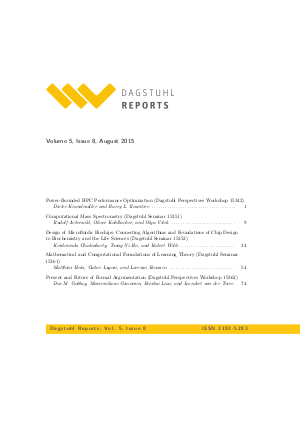Dagstuhl Reports, Volume 5, Issue 8
-
Part of:
Volume:
Dagstuhl Reports, Volume 5
Journal: Dagstuhl Reports (DagRep)

Event
Dagstuhl Seminars 15342 (Perspectives Workshop), 15351, 15352, 15361Publication Details
- published at: 2016-01-19
- Publisher: Schloss Dagstuhl – Leibniz-Zentrum für Informatik
- DBLP: db/journals/dagstuhl-reports/dagstuhl-reports5
Access Numbers
- Detailed Access Statistics available here
-
Total Document Accesses (updated on a weekly basis):
0PDF Downloads
Documents
Dagstuhl Reports, Volume 5, Issue 8, August 2015, Complete Issue
Abstract
Cite as
Dagstuhl Reports, Volume 5, Issue 8, Schloss Dagstuhl – Leibniz-Zentrum für Informatik (2016)
Copy BibTex To Clipboard
@Article{DagRep.5.8,
title = {{Dagstuhl Reports, Volume 5, Issue 8, August 2015, Complete Issue}},
journal = {Dagstuhl Reports},
ISSN = {2192-5283},
year = {2016},
volume = {5},
number = {8},
publisher = {Schloss Dagstuhl -- Leibniz-Zentrum f{\"u}r Informatik},
address = {Dagstuhl, Germany},
URL = {https://drops.dagstuhl.de/entities/document/10.4230/DagRep.5.8},
URN = {urn:nbn:de:0030-drops-56929},
doi = {10.4230/DagRep.5.8},
annote = {Keywords: Dagstuhl Reports, Volume 5, Issue 8, August 2015, Complete Issue}
}
Dagstuhl Reports, Table of Contents, Volume 5, Issue 8, 2015
Abstract
Cite as
Dagstuhl Reports, Volume 5, Issue 8, pp. i-ii, Schloss Dagstuhl – Leibniz-Zentrum für Informatik (2016)
Copy BibTex To Clipboard
@Article{DagRep.5.8.i,
title = {{Dagstuhl Reports, Table of Contents, Volume 5, Issue 8, 2015}},
pages = {i--ii},
journal = {Dagstuhl Reports},
ISSN = {2192-5283},
year = {2016},
volume = {5},
number = {8},
publisher = {Schloss Dagstuhl -- Leibniz-Zentrum f{\"u}r Informatik},
address = {Dagstuhl, Germany},
URL = {https://drops.dagstuhl.de/entities/document/10.4230/DagRep.5.8.i},
URN = {urn:nbn:de:0030-drops-56911},
doi = {10.4230/DagRep.5.8.i},
annote = {Keywords: Dagstuhl Reports, Table of Contents, Volume 5, Issue 8, 2015}
}
Power-Bounded HPC Performance Optimization (Dagstuhl Perspectives Workshop 15342)
Abstract
Cite as
Dieter Kranzlmüller and Barry L. Rountree. Power-Bounded HPC Performance Optimization (Dagstuhl Perspectives Workshop 15342). In Dagstuhl Reports, Volume 5, Issue 8, pp. 1-8, Schloss Dagstuhl – Leibniz-Zentrum für Informatik (2016)
Copy BibTex To Clipboard
@Article{kranzlmuller_et_al:DagRep.5.8.1,
author = {Kranzlm\"{u}ller, Dieter and Rountree, Barry L.},
title = {{Power-Bounded HPC Performance Optimization (Dagstuhl Perspectives Workshop 15342)}},
pages = {1--8},
journal = {Dagstuhl Reports},
ISSN = {2192-5283},
year = {2016},
volume = {5},
number = {8},
editor = {Kranzlm\"{u}ller, Dieter and Rountree, Barry L.},
publisher = {Schloss Dagstuhl -- Leibniz-Zentrum f{\"u}r Informatik},
address = {Dagstuhl, Germany},
URL = {https://drops.dagstuhl.de/entities/document/10.4230/DagRep.5.8.1},
URN = {urn:nbn:de:0030-drops-56757},
doi = {10.4230/DagRep.5.8.1},
annote = {Keywords: Exascale computing, Energy efficiency, Power awareness, Scalability}
}
Computational Mass Spectrometry (Dagstuhl Seminar 15351)
Abstract
Cite as
Rudolf Aebersold, Oliver Kohlbacher, and Olga Vitek. Computational Mass Spectrometry (Dagstuhl Seminar 15351). In Dagstuhl Reports, Volume 5, Issue 8, pp. 9-33, Schloss Dagstuhl – Leibniz-Zentrum für Informatik (2016)
Copy BibTex To Clipboard
@Article{aebersold_et_al:DagRep.5.8.9,
author = {Aebersold, Rudolf and Kohlbacher, Oliver and Vitek, Olga},
title = {{Computational Mass Spectrometry (Dagstuhl Seminar 15351)}},
pages = {9--33},
journal = {Dagstuhl Reports},
ISSN = {2192-5283},
year = {2016},
volume = {5},
number = {8},
editor = {Aebersold, Rudolf and Kohlbacher, Oliver and Vitek, Olga},
publisher = {Schloss Dagstuhl -- Leibniz-Zentrum f{\"u}r Informatik},
address = {Dagstuhl, Germany},
URL = {https://drops.dagstuhl.de/entities/document/10.4230/DagRep.5.8.9},
URN = {urn:nbn:de:0030-drops-56765},
doi = {10.4230/DagRep.5.8.9},
annote = {Keywords: computational mass spectrometry, proteomics, metabolomics, bioinformatics}
}
Design of Microfluidic Biochips (Dagstuhl Seminar 15352)
Abstract
Cite as
Krishnendu Chakrabarty, Tsung-Yi Ho, and Robert Wille. Design of Microfluidic Biochips (Dagstuhl Seminar 15352). In Dagstuhl Reports, Volume 5, Issue 8, pp. 34-53, Schloss Dagstuhl – Leibniz-Zentrum für Informatik (2016)
Copy BibTex To Clipboard
@Article{chakrabarty_et_al:DagRep.5.8.34,
author = {Chakrabarty, Krishnendu and Ho, Tsung-Yi and Wille, Robert},
title = {{Design of Microfluidic Biochips (Dagstuhl Seminar 15352)}},
pages = {34--53},
journal = {Dagstuhl Reports},
ISSN = {2192-5283},
year = {2016},
volume = {5},
number = {8},
editor = {Chakrabarty, Krishnendu and Ho, Tsung-Yi and Wille, Robert},
publisher = {Schloss Dagstuhl -- Leibniz-Zentrum f{\"u}r Informatik},
address = {Dagstuhl, Germany},
URL = {https://drops.dagstuhl.de/entities/document/10.4230/DagRep.5.8.34},
URN = {urn:nbn:de:0030-drops-56776},
doi = {10.4230/DagRep.5.8.34},
annote = {Keywords: cyber-physical integration, microfluidic biochip, computer aided design, hardware and software co-design, test, verification}
}
Mathematical and Computational Foundations of Learning Theory (Dagstuhl Seminar 15361)
Abstract
Cite as
Matthias Hein, Gabor Lugosi, and Lorenzo Rosasco. Mathematical and Computational Foundations of Learning Theory (Dagstuhl Seminar 15361). In Dagstuhl Reports, Volume 5, Issue 8, pp. 54-73, Schloss Dagstuhl – Leibniz-Zentrum für Informatik (2016)
Copy BibTex To Clipboard
@Article{hein_et_al:DagRep.5.8.54,
author = {Hein, Matthias and Lugosi, Gabor and Rosasco, Lorenzo},
title = {{Mathematical and Computational Foundations of Learning Theory (Dagstuhl Seminar 15361)}},
pages = {54--73},
journal = {Dagstuhl Reports},
ISSN = {2192-5283},
year = {2016},
volume = {5},
number = {8},
editor = {Hein, Matthias and Lugosi, Gabor and Rosasco, Lorenzo},
publisher = {Schloss Dagstuhl -- Leibniz-Zentrum f{\"u}r Informatik},
address = {Dagstuhl, Germany},
URL = {https://drops.dagstuhl.de/entities/document/10.4230/DagRep.5.8.54},
URN = {urn:nbn:de:0030-drops-56783},
doi = {10.4230/DagRep.5.8.54},
annote = {Keywords: learning theory, non-smooth optimization (convex and non-convex), signal processing}
}
Present and Future of Formal Argumentation (Dagstuhl Perspectives Workshop 15362)
Abstract
Cite as
Dov M. Gabbay, Massimiliano Giacomin, Beishui Liao, and Leendert van der Torre. Present and Future of Formal Argumentation (Dagstuhl Perspectives Workshop 15362). In Dagstuhl Reports, Volume 5, Issue 8, pp. 74-89, Schloss Dagstuhl – Leibniz-Zentrum für Informatik (2016)
Copy BibTex To Clipboard
@Article{gabbay_et_al:DagRep.5.8.74,
author = {Gabbay, Dov M. and Giacomin, Massimiliano and Liao, Beishui and van der Torre, Leendert},
title = {{Present and Future of Formal Argumentation (Dagstuhl Perspectives Workshop 15362)}},
pages = {74--89},
journal = {Dagstuhl Reports},
ISSN = {2192-5283},
year = {2016},
volume = {5},
number = {8},
publisher = {Schloss Dagstuhl -- Leibniz-Zentrum f{\"u}r Informatik},
address = {Dagstuhl, Germany},
URL = {https://drops.dagstuhl.de/entities/document/10.4230/DagRep.5.8.74},
URN = {urn:nbn:de:0030-drops-56792},
doi = {10.4230/DagRep.5.8.74},
annote = {Keywords: Argumentation, Non-monotonic Logic, Multi-Agent Systems}
}